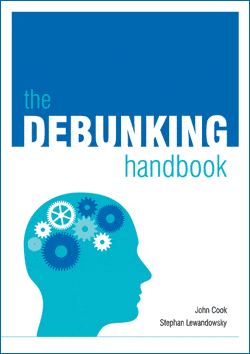For quite some time here at DeSmogBlog, I’ve been writing about the growing science of irrationality—in other words, our ever-better scientific understanding of why people reject clearly correct information. I believe we can’t possibly get to a better place, in debates over issues like global warming, until we understand why getting facts across turns out to be so difficult.
A large amount of psychological science has now been published on this matter—but boiling it all down into a practical, usable guide for someone who wants to communicate in a scientifically-informed way? Not so much.
Not until now.
I simply cannot believe that John Cook of Skeptical Science and psychologist Stephan Lewandowsky managed, in just 8 pages, to create something as magnificent as their new Debunking Handbook. It is packed not only with wonderful graphics, but also with a clear explanation of why many attempts to defeat misinformation fail, and what steps must be taken to do a better job.
The core issue, of course, is one that I’ve written much about—too many scientists assume that that facts win out on their own, but that isn’t actually true. If you base your communication strategy on this misconception, you will fail very badly.
Instead, Cook and Lewandowky explain that there are a variety of “backfires” that can be triggered by uninformed communication styles. Stating a myth before debunking can actually reinforce it. Debunking a myth with an overload of information can also backfire. And attacking a worldview can backfire most of all.
So what do you do? You should read their guide, but basically it boils down to several principles:
1. Don’t lead with the wrong view you’re trying to debunk, but rather, with the correct view you want to instill.
2. Don’t overload people with information. Be “lean, mean, and easy to read.”
3. Don’t attack worldviews—either find more persuadable audiences, or defuse deeply seated ideological resistance through practices like framing and self-affirmation, which reduce defensiveness. “Self affirmation and framing aren’t about manipulating people,” write Cook and Lewandowsky, “They give the facts a fighting chance.”
4. Don’t leave someone with nothing to believe—if you want to unseat a myth, you’d better provide a better real explanation in its place. “When you debunk a myth, you create a gap in the person’s mind,” reads the Handbook. “To be effective, your debunking must fill the gap.”
On top of these key points, there are a variety of more practical bits of advice like:
1. Use graphics to convey correct information. Especially graphics as good as the ones that Cook and Lewandowsky use.
2. Use sound bites. Your bottom line needs to be Tweet-able.
3. Sometimes, it is better to reduce the credibility of a source than to frontally attack its wrong claims.
As someone who teaches science communication, I’m going to recommend Cook’s and Lewandowsky’s handbook to as many folks as I can find.
Perhaps the best aspect of all: They follow their own principles. They are short, sweet, use brilliant graphics and….well, if you don’t believe in this approach to science communication already, they’ll change your mind.
If anything can, anyway.
Subscribe to our newsletter
Stay up to date with DeSmog news and alerts






